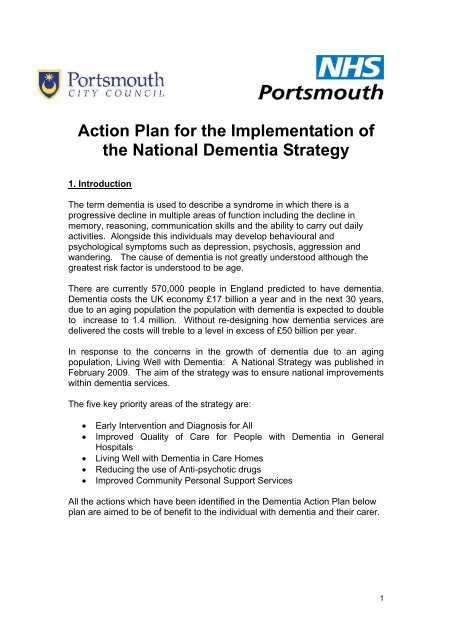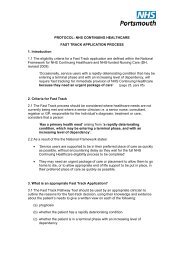Dementia Action Plan - NHS Portsmouth
Dementia Action Plan - NHS Portsmouth
Dementia Action Plan - NHS Portsmouth
You also want an ePaper? Increase the reach of your titles
YUMPU automatically turns print PDFs into web optimized ePapers that Google loves.
<strong>Action</strong> <strong>Plan</strong> for the Implementation ofthe National <strong>Dementia</strong> Strategy1. IntroductionThe term dementia is used to describe a syndrome in which there is aprogressive decline in multiple areas of function including the decline inmemory, reasoning, communication skills and the ability to carry out dailyactivities. Alongside this individuals may develop behavioural andpsychological symptoms such as depression, psychosis, aggression andwandering. The cause of dementia is not greatly understood although thegreatest risk factor is understood to be age.There are currently 570,000 people in England predicted to have dementia.<strong>Dementia</strong> costs the UK economy £17 billion a year and in the next 30 years,due to an aging population the population with dementia is expected to doubleto increase to 1.4 million. Without re-designing how dementia services aredelivered the costs will treble to a level in excess of £50 billion per year.In response to the concerns in the growth of dementia due to an agingpopulation, Living Well with <strong>Dementia</strong>: A National Strategy was published inFebruary 2009. The aim of the strategy was to ensure national improvementswithin dementia services.The five key priority areas of the strategy are:• Early Intervention and Diagnosis for All• Improved Quality of Care for People with <strong>Dementia</strong> in GeneralHospitals• Living Well with <strong>Dementia</strong> in Care Homes• Reducing the use of Anti-psychotic drugs• Improved Community Personal Support ServicesAll the actions which have been identified in the <strong>Dementia</strong> <strong>Action</strong> <strong>Plan</strong> belowplan are aimed to be of benefit to the individual with dementia and their carer.1
2. Where are we nowCurrently services are being offered by a multitude of providers across the cityof <strong>Portsmouth</strong>. The quality of service varies dependent upon which part of thedementia care services are being accessed and timing of access.A regional baseline review took place in each Primary Care Trust area toidentify the key areas for improvement and best practice. The informationrelates to the standards of dementia care in 2007-2008, which was prior to thepublication of the national strategy. The purpose of this review was to informhow the strategy could impact on those with dementia. The review will becompleted in 2015 to measure the success of the National <strong>Dementia</strong> Strategy.Key points from the baseline review for <strong>Portsmouth</strong> were:• <strong>Portsmouth</strong> services are good at recording statistics on people withdementia, therefore a high percentage of the population thought tohave dementia (expected prevalence) are known to services.• <strong>Portsmouth</strong> statistics show that there are a high number of admissionsin acute, mental health and secondary care settings. This is due togood recording of dementia within these areas and although it shows<strong>Portsmouth</strong> with a high rate of admissions, these are in line withexpected admissions based on population and prevalence.• The assessment illustrated that although a dementia diagnosis resultedin patients having a slightly longer stay in an inpatient bed, this was stillsignificantly less than other local areas.• The money spent on organic mental health disorders includingdementia was high in comparison to other local PCT areas• There were a low number of clients identified as having support fromsocial care against the expected prevalence of dementia. Within theassessment it was acknowledged that this was due to data recordingissues which have since been improved.Currently <strong>Portsmouth</strong> is undertaking a Joint Strategic Assessment of Needsfor those with dementia. This will ensure that the future decisions made arerobust and centred on the needs of the local population.3. The Vision for <strong>Dementia</strong> CareIn the future dementia care will be an integrated provision of services throughpartnership working between Health, Social Care and relevant third sectorproviders. The workforce for those working directly with dementia will beknowledgeable and compassionate around dementia.4. Accountability for the <strong>Dementia</strong> <strong>Action</strong> <strong>Plan</strong>A steering group has been established which is supported by the Director ofPublic Health. With the proposed changes to the <strong>NHS</strong> this is hoped tomitigate the risk of the <strong>Dementia</strong> Strategy becoming lost. The steering groupis a collaboration of the local Health, Social Care and third sector2
organisations. Accountability for the implementation of the <strong>Dementia</strong> <strong>Action</strong><strong>Plan</strong> lies with the Integrated Commissioning Board, a partnershiparrangement between the City Council and <strong>NHS</strong> <strong>Portsmouth</strong>.5. Stakeholders involved in the delivery of the <strong>Dementia</strong> <strong>Action</strong> <strong>Plan</strong>The following list details the key stakeholders involved in the implementationof the <strong>Dementia</strong> Strategy. The list is not exclusive.An individual with dementiaAlzheimer’s Society and othercharitable organisations within thecityCare HomesCarers of someone with thedementiaDomiciliary Care ProvidersGeneral Practitioners<strong>NHS</strong> <strong>Portsmouth</strong> – Commissioners<strong>NHS</strong> <strong>Portsmouth</strong> Public HealthNursing Homes<strong>Portsmouth</strong> City Council<strong>Portsmouth</strong> Hospitals <strong>NHS</strong> TrustResidents of <strong>Portsmouth</strong>Solent HealthcareSouth Central AmbulanceThird Sector Providers3
NDS Objective Goal <strong>Action</strong> Timescale Indicator AccountabilityImproving publicand professionalawareness andunderstanding ofdementiaGood qualityinformation forthose diagnosedwith dementia andtheir carersImproveawareness ofdementia acrossthe communityand decrease thestigma associatedwith the illness.Enablingindividuals toaccess help andadvice earlier inthe pathway to aidliving well withdementia.Awareness campaigns to take place 2011-2014Completion of Joint Service NeedAssessment (JSNA)Reduce isolation and increase socialinclusion for an individual with dementia andtheir carer.Identify clear pathway routes for individualsrequiring low level supportDevelop and progress memory supportservicesReadily available information, concerninglocal services and relevant informationconcerning illness, to be made availablethrough a variety of formatsAudit of awarenesscampaigns2011 Completion of JSNA2011-20142011-12201220112011Increased quality oflife for an individualwith dementia% of individualsaccessing peersupport% of those diagnosedwith dementia with apersonalised careplan includinginformationrequirements80% of expectedprevalence ofdementia to berecorded via QualityOutcome FrameworkdataNumbers of carersattending memorycourseIntegrated CommissioningBoardIntegrated CommissioningBoard4
Enabling easyaccess to care,support andadvice followingdiagnosisDevelopment ofstructured peersupport andlearning networksSupport forindividuals withdementia and theircarers throughoutthe course of theillness.For a range ofopportunities to bemade available tothose withdementia topromote theirindependence andquality of lifeincludingimproved physical,emotional andpsychologicalwell- being.Accessibility of services in <strong>Portsmouth</strong>including the BME communities, those withlearning disabilities and early onset dementiaEnsure good access to non drug treatmentssuch as memory training, cognitivestimulation therapy etcInvestigate the role and establish if there is alocal need for admiral nurses and dementiaadvisorsWork with primary care to identifyopportunities to track individual needs andensure that referrals are made to appropriateservices at the appropriate time.Develop a hub for those with dementia tosupport information finding and promote peersupport. Including options for socialenterpriseExplore options for people using personalbudgets20122012/132011/122012/132012/132012/13% of those from aBME community,those with a learningdisability or thosewith early onsetdementia identifiedwith dementia againstexpected prevalenceNumber of serviceusers attendingservicesImproved timelinessof services% of individuals ableto access peer andlearning networksPersonal budgetsbeing used to accessservicesIntegrated CommissioningBoardIntegrated CommissioningBoard5
Improvedcommunitypersonal supportservicesImplementing theCarer' Strategy forPeople with<strong>Dementia</strong>A good qualityrange of servicesare available tosupport those withdementia and theircarers to live athome.Improved supportfor carers ofpeople withdementia.Implementation of the "Putting People First"personalisation changesEnsure that community teams are accessibleto all including care and residential homesSupport of the implementation of the carersstrategyAdoption of person centred approaches inplanning and delivery of respite provisionand breaks for carersongoing to 20132013ongoing to 2014ongoing to 2014Evaluation of serviceuser experience ofdomiciliary careproviders% of those with apersonalised careplan includingcontingency plans% of carersaccessing trainingand support% of carers of thosewith dementia whoundertake anassessment of needsIntegrated CommissioningBoardIntegrated CommissioningBoardImproved qualityof care for peoplewith dementia ingeneral hospitalsA consistentapproach to carethroughout thehospital ensuringdignity and quality.Ensure that training is available to providecore competencies for secondary care staffwho are in contact with people with dementiaand that there is appropriate involvement ofcarers within the medical pathwayRespond to the needs as identified within theJSNA and Hospital Audit2012/132012/13% of delayeddischarges for thosewith dementia% of frontline staffwho have receiveddementia awarenesstrainingResponse ofsatisfaction surveysin inpatient wardsIntegrated CommissioningBoardLinks to Learning andDevelopmentAcute Hospital PatientSatisfactionImprovedintermediate carefor people withdementiaEqual access tosupport andrehabilitationservices.Improve rehabilitation options for those withmild and moderate dementia to accessphysical rehabilitation2012/13% of services whowould not allowaccess to a service ifan individual has lowlevel dementiaIntegrated commissioningBoardLinks: HASP6
Considering thepotential forhousing support,housing relatedservices andtelecare to supportpeople withdementia and theircarersLiving well withdementia in carehomesImproved end oflife care for peoplewith dementiaEnabling thosewith dementia tolive interpedentlyfor as long aspossible.Improve thequality of care inall care homes forthose withdementia.Services able tosupport individualsin planning theirpreferred pathwaythrough advancedcare planning ordirectivesDevelopment of robust care pathways forintermediate care for people with dementiaWork with <strong>Portsmouth</strong> City Council toensure that future developments are suitablefor those with dementiaEnable improved access to telecare for thosewith dementiaPromote the expectation that there will be anidentified dementia lead within eachresidential and care home to promoteawareness and take forward qualityimprovement initiativesEnsure that person centred care planning isimplemented in all homesEnsuring appropriate use of Anti-psychoticmedication for people with dementiaEnsure that those with dementia haveaccess to high quality End of Life care2012-2014ongoing to 2014ongoing to 20142011/122012ongoing to 2014ongoing to 2014ongoing to 2014Number of extra daysan individual may bein an inpatient beddue to havingdementia incomparison to anindividual withoutdementia% of dementiafriendly placementswithin the cityNumbers of peoplewith access totelecare% of homes withidentified dementiachampion% of individualswithin homes whohave a personalisedcare plan% of those on antipsychoticdrugs% of staff who haveundergone EOLtraining% of individuals withdementia who havean advanced careIntegrated CommissioningBoardLinks: Care Home ForumIntegrated CommissioningBoardLinks to EOL StrategyPalliative Care Network7
planAn informed andeffectiveworkforce forpeople withdementiaDevelopment of acompassionateandknowledgeablework force withthe skills andexpertise to beproportionate tolevel of contactstaff have withpeople withdementia.Development of nursing support and painrelief for those with dementiaDevelop communication and training plan tostaff working within health and social careDevelopment of core training competenciesfor key roles and reviewing the educationand training packages to supportongoing to 20142011/122011-2013All contracts include specific requirementsfor dementia training for staff 2012/13Number ofcomplaints /compliments fromproviders around Endof Life Care% of staff who haveundergone dementiaawareness training% of contracts whichinclude dementiatraining requirementsEvaluation ofeffectiveness ofdementia trainingIntegrated CommissioningBoardLinks to Learning andDevelopment8









